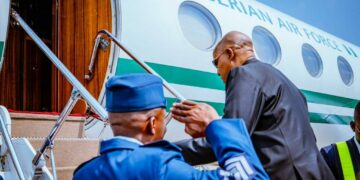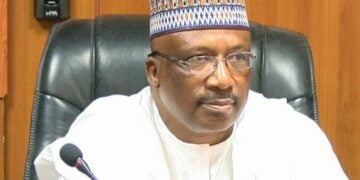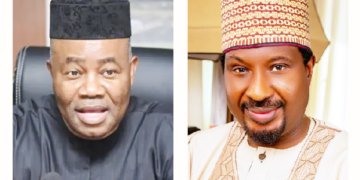Friday, May 10, 2024, was indeed a significant day for the people and government of Nasarawa State. The day represented a turning point in the relentless effort of Governor Abdullahi Sule to transform the state into an investors’ and industrial hub.
On that day, the commissioning of a multimillion-dollar lithium processing factory by President Bola Tinubu through the country’s number three citizen, Senator Godswill Akpabio, was a dream come true for the state’s chief executive, and as analysts observed, a catalyst for economic, as well as industrial transformation, of the rural state.
The factory, which was built by a Chinese firm, Avatar New Energy Materials Company Limited, and located in Udege community of Nasarawa LGA, has the capacity to the produce 4,000 metric tonnes of lithium concentrate per day, with an expansion plan to achieve annual target of 300,000 metric tonnes per annum within the next two years.
The analysts noted that with a $500m turnover and $35m in profits and taxes in Nigeria alone, Avatar had a sustainable profile to turn around the state’s economic fortunes in revenue generation and employment opportunities.
Our correspondent reports that the event elicited more interests in the solid minerals sector, from where the state draws its name, with a promise by another Chinese conglomerate and leading energy giant, Canmax Technologies, investing a $200m to process lithium that abound in the state.
Recall that Canmax Technologies is responsible for over 30 per cent of global battery materials production.
Our correspondent reports that among the mineral deposits in the state, lithium, in the last few years, has somehow become the beautiful bride, with investors sinking hundreds of millions of hard currencies in its exploration.
Findings indicate that the North Central states are virtually sitting on lithium, with Nasarawa having the largest deposits.
This was confirmed by Gov Sule at a forum recently when he said the state indeed had the highest commercial quantity of the most sought-after mineral, adding that the state had the highest number of investors in the solid minerals sector.
Reports indicate that three companies are presently working to prospect over 25,000 tonnes per day of lithium in the two LGAs of Nasarawa and Karu. They are Landmark Lithium Mining Company, which is targeting 3,000 tonnes of lithium a day; RSIN, which is working to process 4,500 tonnes in Karshi; and Ganfeng Lithium Mining Company, which performed the groundbreaking of its $250m factory that will process 18,000 metric tonnes per day in Endo village in the Udege Development Area in Nasarawa LGA.
The Ganfeng initiative alone, its President, Mr Pan Quan, said, “The plant will provide directly 2,500 jobs and indirectly more than 15,000 jobs. After the completion of the factory, it would boost the market economy and impact skills to young people. The investment would attract more Chinese investors into the country and Nasarawa State in particular. Infrastructure will be improved. The community will be more energetic, and every community member will work with us to create a win-win situation.”
Observers believe that the growing interest in Nasarawa’s minerals is due to the favourable investment climate put in place by Gov Sule through rural and urban infrastructure which makes all parts of the state accessible by a good road network.
They also contend that unlike some other northern states, where insecurity has frustrated efforts at drawing investors in, Gov Sule moved against criminal elements, forcing them to retreat elsewhere, thereby giving investors leeway to operate.
However, beyond the above variables, they point out that the governor’s public sector experience garnered over decades from leading conglomerates in the country and abroad must have aided the current success stories the state is experiencing.
The ongoing transformation which stands the state out as a leading economy, they noted, derived its foundation from the Nasarawa Economic Development Strategy (NEDS) document which encapsulated enduring systems and business models that would tackle the root causes of poverty in the state; launched at the onset of Gov Sule’s administration in 2019.
The NEDS document, which defines the governor’s development blueprint, led to the establishment of the Nasarawa State Investment Development Agency (NASIDA).
Gov Sule sought 15 thorough-bred global economic players and conscripted them into a think tank called the Nasarawa State Economic and Investment Advisory Council (NSEIAC) and tasked them to bring to bear their wealth of experiences and ginger the implementation of NEDS as a pathway to unlocking all constraints which might have hitherto hindered the inflow of investments into Nasarawa.
When he presented a copy of the NEDS document to the United Nations (NU) Deputy Secretary General, Amina Mohammed, on the sidelines of the 74th UNGA in New York, US, in September, 2019, Gov Sule promised that Nasarawa would be one of the top three competitive states in Nigeria when he rounded up his first term by 2023. Almost a year into his second tenure, the state has leaped beyond the postulation, with analysts describing it as the country’s fastest growing economy and leading investment destination.
The governor’s achievements drew accolades from the president, the minister who oversees the solid minerals sector, Dele Alake, and the investors doing business in the state during last Friday’s commissioning.
Alake described the governor as visionary in his governance approach which had yielded economic benefits to Nasarawa State and commended him for providing the enabling environment for the private sector to take charge as the main driver of the economy of the state.





